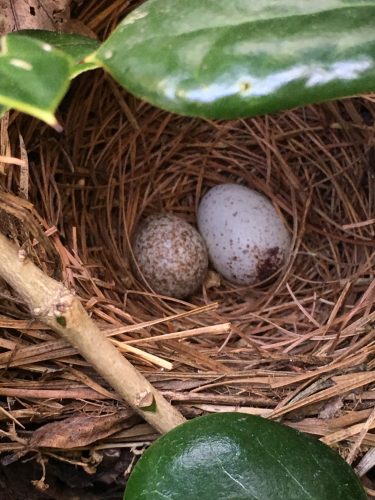Participant Photos
upload and share photos
Photo Submission
Submitted By
Febe Leiva
Atlanta, GA, USA
Description
Been monitoring Northern Cardinal nest but one egg is gone and I haven’t seen the momma bird in a long time. could be bigger egg that is missing was dropped by a cowbird, unsure.
Category
Species
Tags
Continue Browsing
Tag:












That is a cow bird egg, This is a hint, Missing Egg. The cow bird will eat then lay a egg.
we found a nest containing 3 light pink specckled eggs about noon today: what bird would lay those ? found.. in a rose of sharon tree about 4 ft up and in full sun at the time. most of our birds have blue eggs. i told my daughter i would check around for her–she has doves that return everyyear to the gazebo, robins, cardinals blue birds jays, a variety of wild birds and she feels that most return to her yard yearly as have the doves and their families
if you could answer the question for me to tell her, we’d appreciate it
Hi Edith,
Nests and eggs can sometimes be difficult to identify – please send a photo of the nest and eggs to nestwatch@cornell.edu and please let us know where it was found (city, state)and the kind of habitat surrounding the nest (mostly residential, woodland, fields, etc.). These details will help narrow down the possible species.
Should you remove a cowbird egg if found in another passerine’s nest?
Hi Nancy, Brown-headed Cowbirds are a species native to North America, and therefore protected by federal laws. You should not remove cowbird eggs from another birds nest. There are some states which may have exceptions to this law, particularly when the cowbirds are negatively affecting an endangered species such as the Kirtland’s Warbler, but removing cowbird eggs remains illegal unless you have proper federal permits or are under the direction of someone with said permits. Note that there are many bird species that have developed their own defenses against cowbirds, and that the diet of some hosts, such as House Finches, do not support cowbird young. If you have further questions, please contact us via email at nestwatch@cornell.edu.
Removing cowbird eggs is illegal and cruel.
As a native species, the Brown-headed Cowbird is protected under the Migratory Bird Treaty Act, and taking eggs is illegal. So any person who violates the Migratory Bird Treaty Act by murdering baby cowbirds is subject to a criminal penalty of up to $5,000 for each bird unlawfully taken, killed, harassed, or possessed; civil restitution fee for each bird unlawfully taken or possessed; and a license suspension or revocation